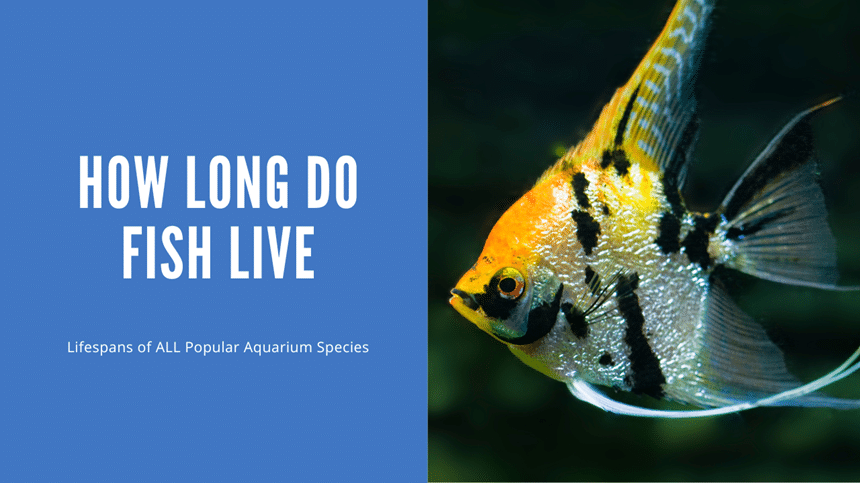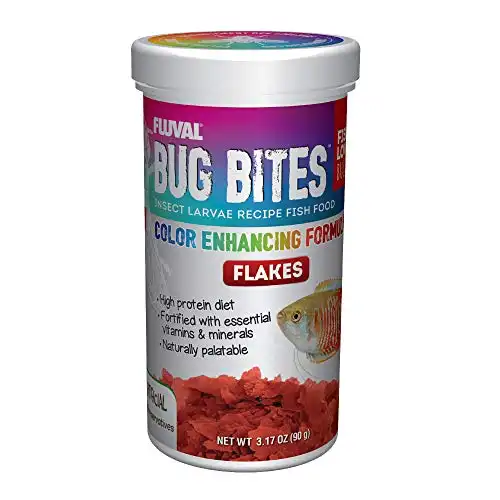Thank you for visiting! By the way… any links on this page that lead to products on Amazon and other stores/partners are affiliate links Aquarium Store Depot earns a commission if you make a purchase.
Buying fish, or any other pet, is a long-term commitment, so it’s really important to consider their average lifespan. Most people have an idea of how long a cat or a dog might live, but what about fish?
In this guide, I’ll answer the question of how long do fish live by providing the average lifespans of popular aquarium fish and dive into the factors that affect their longevity.
Let’s get started!
How Long Do Fish Live (By Category)
There are over 30,000 fish species on the planet, ranging from tiny nano species to the majestic 60-foot whale shark1. Their lifespans seem to vary as much as their size and appearance, with some species surviving just a few months and others living for centuries! Check our video above for visuals from our YouTube Channel. We go over in more detail in our blog post so you can follow along with both!
The average aquarium fish lives a few years with good care, although some species can live for a few decades. After reading this guide, you’ll see that there’s a lot of variation between the species.
Size And Growth
Unlike humans, fish are indeterminate growers, which means they continue to grow throughout their lives. It can be difficult to guess the age of a fish over at the pet store, but you can bet a large specimen has already reached a good age.
Scientists have a more precise way of judging a fish’s age. They simply count the rings on their scales, kind of like the way you tell the age of a tree2. Unfortunately, there isn’t a lot of concrete scientific evidence about aquarium fish lifespans out there, so most of what we know comes from the experiences of other fish keepers.
Of course, many factors can affect how long fish live. For example, a fish that can live for ten years might survive just a few hours in a tank with incorrect water temperature, or it could surprise you and live for 12 years.
We’ll discuss some of the factors that affect fish longevity later in this post, but for now, let’s go ahead and dive into the average life expectancies of some popular aquarium fish you might consider keeping in your tanks.
Small Fish Lifespans
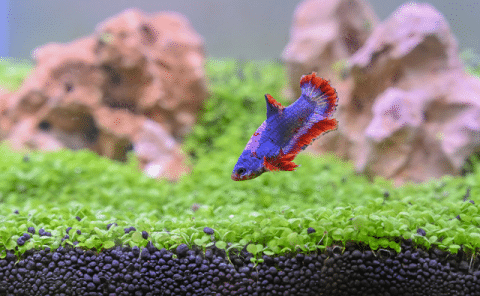
Smaller fish tend to have short lifespans, although some nano species can live surprisingly long! You could expect your pets to reach these lifespans with good care and a bit of luck:
- Betta fish/Siamese fighting fish: 2-4 years
- Cherry barb: 4-7 years
- Corydoras catfish: 5-15 years
- Danios: 2-5 years
- Dwarf pufferfish: 3-5 years
- Gouramis: 4-8 years
- Guppy: 2-3 years
- Hatchetfish: 2-5years
- Japanese Ricefish: 3-4 years
- Killifish: 1-3 years
- Kuhli loach: 10-14 years
- Neon Tetras: 2-5 years
- Otocinclus catfish: 5-8 years
- Rams: 2-3 years
- Rasboras: 5-8 years
- Platy: 3-4 years
- Scarlet badis: 3-6 years
- Tiger barbs: 4-6 years
- White Cloud Mountain minnow: 7 years
Medium Species
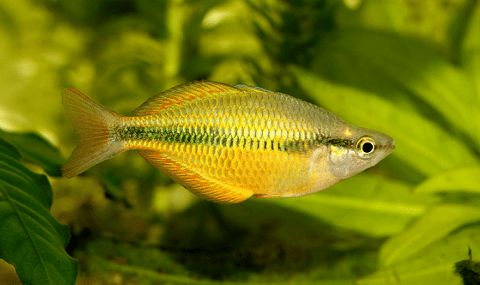
The average medium-size fish lifespan is between 5 and 15 years, which makes this group of fish a similar commitment to other popular pets like cats and dogs. Read on to learn about some popular medium aquarium fish lifespans.
- African Cichlids: 5-10+ years
- Angelfish: 10-12 years
- Blood Parrot: 5-15 years
- Blue Acara: 8-10 years
- Bristlenose pleco: 10-15 years
- Common Goldfish: 10-15 years
- Convict Cichlid: 8-10 years
- Discus cichlid: 10-18 years
- Fancy goldfish: 10-15 years
- Glass catfish: 7-8 years
- Jack Dempsey: 10-15 years
- Molly: 3-5 years
- Rainbowfish: 5-8 years
- Rainbow shark: 5-8 years
- Siamese Algae Eater: 5-10 years
- Silver dollar: 10 years
- Swordtails: 3-5 years
Large Species
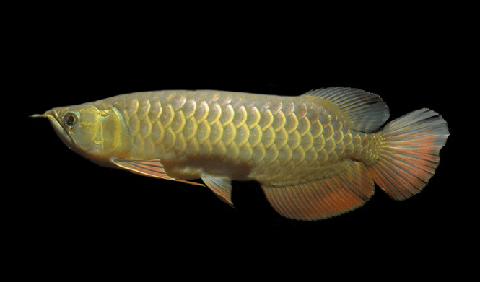
Larger fish tend to live longer, although they need proper care and a suitable aquarium to reach their full potential. Let’s take a look at some big fish lifespans.
- Arowana: 10-20 years
- Bala shark: 10 years
- Bichirs: 10-15 years
- Black ghost knife fish: 10-15 years
- Blood Parrot: 5-15 years
- Clown loach: 10-15 years
- Dojo loach/Weather loach: 10-15 years
- Flowerhorn cichlid: 8-12 years
- Koi fish: 25-35 years, but can over 60 years!
- Oscars cichlids: 10-15+ years
- Plecos: 10-20 years
- Red-tailed Catfish: 15-20 years
- Severum: 10 years
- Tinfoil Barb: 8-10 years
- Tire track eel: 8-18 years
Wild Species

Just in case you were wondering how aquarium fish stack up against wild species, here’s a list of some well-known wild fish and their lifespans:
- Atlantic Salmon: 5-8 years
- Bluegill Sunfish: 5-8 years
- Common Carp: 25-50 years
- Largemouth Bass: 10-15 years
- Rainbow Trout: 5-7 years
- Sturgeon: 50-60 years
Aquarium Invertebrates and Other Aquatic Animals
Fish are not the only animals that live in fish tanks! Continue reading to learn about some other aquatic pet lifespans.
- Cherry shrimp: 1-2 years
- Snails: 1-10 years
- Dwarf Frogs: 5-15 years
- Turtles: 20-40 years
- Axolotls: 10-15 years
9 Factors that Affect Fish Lifespans
The lifespans listed above are possible with good care and a healthy specimen, but tropical fish often live a much shorter lifespan than you might expect. There are many factors that can determine your pet’s longevity, and many of them are in your control as a fish keeper.
Continue reading to learn about nine factors that can increase or decrease aquarium fish longevity.
1. Age At Purchase
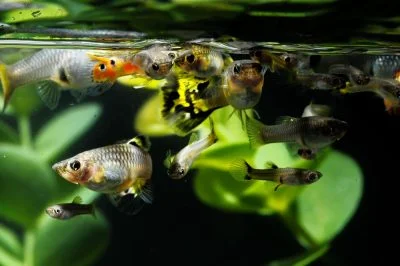
This one might seem pretty obvious, but young fish can live longer than old fish.
Most of the fish you see in the pet store are just a few months old, which means they still have most of their expected lifespan ahead of them. The large, mature specimens you see sometimes are much older, and it can be difficult to tell their age.
Young fish may be more fragile and susceptible to damage than mature specimens, but if you can get them through the acclimation period and the first few weeks in their new tank, these fish can survive for many years.
2. Stocking
Bullying and fighting between the fish in your tank can cause stressful living conditions and reduce your fish’s lifespan. Some fish tend to be more aggressive than others, and you really want to avoid these species when setting up a community tank.
I recommend stocking your tank with peaceful fish that grow to a similar size. This will also prevent any fish from getting snacked on. Remember, big fish eat little fish!
3. Physical Size

If you’ve already scanned through the list of fish and their lifespans, you probably noticed a general trend. Medium-sized fish live longer than small fish, and big fish live even longer.
Most small fish live about three to five years, while large species like koi can live for several decades. There are exceptions, of course. Kuhli loaches can live surprisingly long for their size!
Tank size can play an important role in fish lifespans too. Keeping large fish in a small tank will lead to cramped conditions, poor water quality, and a reduced life expectancy.
4. Genetic Factors And Fancy Breeds
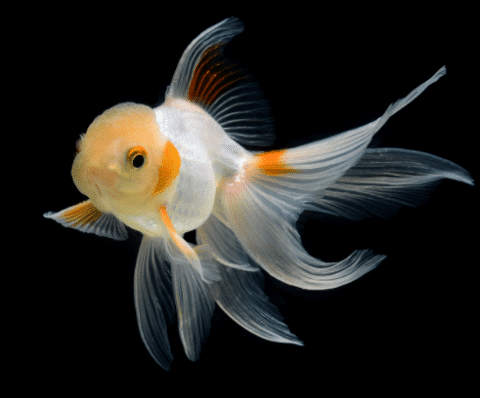
Genetics plays a big role in the lifespans of pet fish. Some betta fish live for over four years, although selective breeding has decreased the average lifespan of some varieties.
Some fancy breeds tend to have shorter lifespans than wild-type fish. This applies to fish like balloon mollies and some fancy goldfish breeds. These fish may be more prone to health issues that affect their internal organs, but they can still lead a full and healthy life with good care.
5. Water Quality
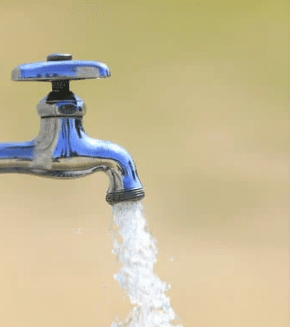
Poor water quality is probably the leading cause of reduced lifespans in pet fish. Keeping a tank clean and maintaining a healthy environment can be tough for beginner fishkeepers, especially if you start with sensitive fish species.
Understanding the aquarium nitrogen cycle and testing your aquarium water regularly will help you maintain a suitable environment and keep your fish healthy, but having the right equipment is also crucial. Tropical fish need good filtration and regular aquarium maintenance to keep their water safe and achieve their full potential life span.
6. Water Parameters
Poor water quality is a major cause of fish mortality, but even well-maintained aquariums can be dangerous for some fish species.
Each fish species has evolved to live in a certain range of water chemistry parameters. Some fish are highly adaptable, while others won’t survive unless you recreate their preferred conditions. Of course, freshwater fish should not be mixed with saltwater fish and vice versa!
I suggest testing the pH level and water hardness of your local water supply before choosing your fish species. It is possible to alter your water chemistry or use bottled or reverse osmosis water in your tanks, but it’s always easiest to choose freshwater fish that will thrive in your local water.
7. Temperature
Incorrect water temperature can reduce fish lifespan to just hours, so this is one factor I really can’t stress enough. Tropical freshwater fish come from warm water habitats, so most fish keepers will need an aquarium heater to keep these fish healthy.
However, you probably won’t need a heater if you live in a tropical region, or keep your home at a constant temperature between about 75 and 80 degrees Fahrenheit. Fish temperature preferences vary depending on the species, so always research the needs of each individual fish species before adding them to a community tank with other fish.
8. Health Problems
Fish are susceptible to various illnesses that can reduce their lifespan. Common diseases include bacterial infections, fungal infections, viruses, and parasitic infections like ich that cause white spots.
Aquarium fish are most vulnerable to health problems when their water quality is low, but they can also develop illnesses when kept in unfavorable water parameters or with unsuitable tank mates.
Disease outbreaks can occur when you add a new fish to your aquarium, so it’s best to confine new fish to a quarantine tank before introducing them to your community aquarium. That way you can monitor your new pet fish for a few weeks and treat them with veterinary medicine if necessary.
9. Diet
Diet quality is another important factor that can increase or decrease your fish’s life expectancy. Different species of fish have different dietary needs, so you may need to provide more than one type of food if you keep multiple species of fish.
A flake version of Fluval's amazing pellet bug bits products. Great for all tropical fish and high in protein.
Modern prepared fish foods contain just about everything your fish need to stay healthy, but you can also supplement their diet with some healthy treats. Carnivorous and omnivorous fish love live or frozen foods like bloodworm and brine shrimp, while omnivorous and herbivorous fish species enjoy healthy snacks like peas and zucchini.
FAQs
How long does a pet fish live?
Depending on the species, most pet fish with live between 1 and 15 years with good care. The average nano fish will live between 3 and 5 years, while medium fish species have longer lifespans in the 5-15 year range.
How long do fish live naturally?
Fish in the wild probably live shorter lifespans than captive fish because they are exposed to more predators and dangerous environmental factors like floods, droughts, and cold snaps. Captive fish can live a surprisingly long life if kept in a clean tank with stable conditions and a high-quality diet.
Which fish species has the shortest lifespan?
According to the Guinness Book of Records, the fish with the shortest lifespan is the seven-figure pygmy goby. These tiny saltwater fish complete their entire life cycle in less than two months!
In the aquarium hobby, livebearers like guppies and platies tend to have shorter lifespans than similar-sized egg layers like the neon tetra. The average guppy has a lifespan of just two to three years.
Which fish live the longest?
The longest-living fish species is the Greenland shark, a species of deep, cold waters in the open ocean. These huge sharks can reach about 23 feet and live for over 400 years! This is one fish you probably don’t want in your home aquarium.
Which fish has the longest lifespan?
Goldfish are about the longest-living aquarium fish species, and some specimens will live over 25 years with proper care.
Koi can live even longer, although these beautiful fish from the carp family are usually housed outdoors in ponds. Their average lifespan is about 25 to 30 years, although one incredible specimen called Hanako is said to have lived for 226 years!
Final Thoughts
Fish lifespans vary between species, but you can use this guide to make a pretty educated guess about how long your fish will live. Of course, you’ll need to provide consistent care if you want your pets to reach their full potential, so check out my extensive range of fish care guides for loads of great advice!
How old is your oldest fish? Let me know in the comments below!
- About the Author
- Latest Posts
I’m thrilled that you found Aquarium Store Depot! Here you’ll find information on fish, aquariums, and all things aquatics related. I’m a hobbyist (being doing this since I was 11) and here to help other hobbyists thrive with their aquariums! I adhere to a high quality Editorial Process and Review products with real life field usage and practical analysis.

